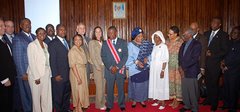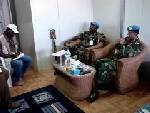The last position I held in the press was Editor-in-Chief, News and Public Affairs Department, Liberia Broadcasting System (LBS). I love journalism, and ingrained in me, is journalism. But one thing I hated about journalism in Liberia was poverty.
The Liberian media is impoverished. Poverty, as defined by Webster's(2000), is the condition or quality of being poor. When I was in the media, that's the kind of condition that I like most Liberian journalists, had to work and live with. We were always penniless. We had tattered and antiquated print and broadcast equipment. We read newscast from manuscripts because most news rooms neither had type writers nor computers.
We ran intermittent broadcast hours because most radio stations could not keep up with the high costs of fuel. In print, the appearance of some newspapers on the news stand was infrequent because most publishers could not afford the costs of printing. The word Internet was never a part of our daily vocabularies.
Even though some of us had college education, our monthly incomes could neither sustain us nor our families because we were underpaid. The monthly salary of most journalists at the time did not exceed $50. Some made as low as $10. And salaries were rarely paid on time. In summary, our working and living conditions were horrendous. Kato/ Gratuity Most of us barely made it. We survived on handouts or gratuities simply referred to in Liberian press corps as, kato.
Our social and economic life was hinged on the generosity of public officials and newsmakers. Even though the media is universally considered, the fourth estate of society, insinuating that media practitioners should be middle-class citizens who are socially well off, in Liberia, our situation was the irony. Literally, we were beggars.
The giving and acceptance of kato was a common practice in the media. Kato despite its ethical implications was a de facto way of life for the press. It was a common language for reporters, media and business executives, politicians, and the ordinary newsmakers. In some news rooms, kato played a crucial role in decision making regarding the assigning of news beats, news contents, and editorials. To simply put, kato was a prime factor in the gathering and reporting of news stories.
Although I left Liberia and active journalism more than six years ago, poverty as a social quandary in the Liberian media, is still the same, or it has further degenerated. Poverty and kato are evil forces that the press contend with in today's Liberia. In 2006, the Analyst newspaper in an editorial noted Journalists are amongst the most impoverished citizens in Liberia. Many live on handouts, dying as paupers.
Prevalence destitution in the Liberian press is not unique to a particular media institution. It is a problem that affects nearly all media institutions. Currently, there are 38 rural and 12 urban radio stations, 41 newspapers, and approximately two television stations in Liberia. Despite the proliferation of media institutions, professional journalism in Liberia is being hindered by poverty.
For instance, in the year, 2006, as noted by the Analyst, many Liberian journalists, who had acceded to what the paper called the highest echelon of their careers, died because they could not afford quality medical attention. The average monthly salary for a reporter as claimed by the Press Union of Liberia (PUL) former Secretary General, Frank Sainworla fluctuates $15 to $20.
In 2006, Radio Veritas, one of Liberia's finest broadcast institutions reduced its broadcast hours and let some of its best broadcasters off the hook because of financial crisis. In the same year, Star Radio, another local radio station, was constrained to redundant some of its broadcasters because of dwindle in its operating budget. The station according to reports, also intends to lay off additional staff during the 2007 fiscal year because of inadequate monetary support. At the nation’s own broadcast entity, Liberia Broadcasting System (LBS), prior to the appointment of Mr. Charles Snetters in 2006 as director general, government was indebted to the employees for 17 months.
Causation
The Liberian media does not exist in utopia. Research showed that the hardship the press corps now grapples with is a by-product of the existing economic landscape in Liberia. Eighty percent of Liberia's estimated 3.2 million people live below the poverty line and unemployment is 70 percent. Liberia experienced more than 14 years civil war. The war crumbled the nation’s economies and basic social services. Because of the decline, the media was directly or indirectly affected. For example, the market for advertisement is meager.
Causation
The Liberian media does not exist in utopia. Research showed that the hardship the press corps now grapples with is a by-product of the existing economic landscape in Liberia. Eighty percent of Liberia's estimated 3.2 million people live below the poverty line and unemployment is 70 percent. Liberia experienced more than 14 years civil war. The war crumbled the nation’s economies and basic social services. Because of the decline, the media was directly or indirectly affected. For example, the market for advertisement is meager.
There are very few advertisers in Liberia and the cost of advertisement is extremely low. A full page advertisement in most Liberian newspapers according to Mr. Sainworla, costs $200. And the price of newspapers is $20 (40 cents U.S.). Liberia has a literacy rate of an estimated 38%. Because of the nation’s high illiteracy rate, readership is very low. Giving the inadequacy of funds generated from sales coupled with the astronomical costs associated with print and broadcast journalism, the Liberian media finds it extremely difficult to sustain itself.
Impacts
Poverty is negatively impacting journalism in Liberia. The impacts are enormous. But for the sake of this article, I will dwell on some of the most salient implications: inefficiency, brain drain, ethical transgressions, and dependence.
Inefficiency
Even though the Liberian media has come long way in bridging the communication gap between the government and the governed, the media is yet to reach its full potential in the gathering and dissemination of public information because of poverty. At the moment, the signals of most radio and television stations can barely travel beyond the confines of Monrovia, Liberia’s capital.
And because of high transportation costs and deplorable road conditions, newspaper circulations and coverage in terms of news gathering and reporting are limited to Monrovia and bordering counties. The inability of the media to cover the entire nation, negates rural inhabitants, who account for a greater percentage of the nation's 3.2 million population the opportunity of being a part of the global village. Such condition lay the basis for hear say amongst the people.
Brain Drain
The Liberian media is greatly affected by brain drain. Although the situation can be attributed to several causes such as death and political, poverty is also a prime element. Because of poverty, most trained and experienced journalists in search of better opportunities have literally abandoned the profession. As a result of the exodus, the Liberian press corps has seen an upsurge in the recruitment of high school drop outs, and social misfits as journalists.
The President of the Press Union of Liberia (PUL), George Barpen in a recent statement regarding the egregious situation, maintained “ Some newspapers managing editors are not high school graduates, (Allafrica.Com, 2006). The recruitment of high school drop outs and social misfits, who have myopic understanding of journalistic principles, contributes significantly to the many professional lapses in the Liberian media.
Ethical Transgressions
Poverty is one of the foremost precipitating factors for the existing credibility problems in the Liberian media. Because the press is poor and literally hungry, and some of its members are always on the look for handouts, or kato, professionalism and media ethics (objectivity, honesty, accuracy, integrity, etc) are usually compromised. For instance, in 2006, Liberia's President, Johnson Sirleaf, in an out burst about how money was allegedly changing hands in the Liberian media and the consequences it had on news contents, claimed “Some media practitioners were checkbook journalists, (Frontpageafrica, 2006).
In 2006, few months following the October, 2005 general and presidential elections in Liberia, the Carter Center and the National Democratic Institute (NDI) amid reports that some presidential hopefuls allegedly paid journalists to write favorable stories about them during the election, cautioned the press to be Mindful of the way they conducted themselves so that they are not taken for granted.
The institutions in a report noted “Those who had money to spend landed on the front pages, and those who did not, had to do with limited coverage, (Frontpageafrica, 2006).
Research on media ethics showed that the giving and acceptance of gratuities such as money and costly material things create dual relationship between journalists and newsmakers, and sometimes makes the adherence to objectivity, a cardinal principle in journalism a challenge for media personnel.
Research on media ethics showed that the giving and acceptance of gratuities such as money and costly material things create dual relationship between journalists and newsmakers, and sometimes makes the adherence to objectivity, a cardinal principle in journalism a challenge for media personnel.
It undermines the credibility of the press and creates ethical dilemma for media practitioners in the execution of their duties. According to seasoned journalist, John Pallato, Editor of the US based eWeek.com’s Enterprise Application Center, media institutions in many societies prohibit journalists in their employ from accepting gifts because even the smallest gift carries with it the assumption that “Whose bread I eat, his song I sing.
Dependence
Dependence
Giving the inability of the media to sustain itself because of insolvency, it can be argued that Liberia in truest, does not have an independent press. Liberia has an ideological independent media, which survival hinges on charity. Dependence on charity makes the media vulnerable to infiltrators.
Conclusion
Admittedly, I know that the problems and professional lapses mentioned in this article are not unique to the Liberian press. These are problems that the media in most developing countries, especially in Africa grapple with. But with a concerted effort involving the Liberian government, international community, Press Union of Liberia (PUL), and owners of media institutions, these problems no matter how herculean they may seem, can be alleviated. The Liberian government through MICAT and the PUL in particular, can address the issue of poverty in the Liberian media by seeking and mobilizing resources for economic empowerment.
To do this, the PUL must transcend its current role of media advocacy to formulating strategies that would address matters relating to the salaries and welfare of journalists, merger of media institutions with common editorial goals and objectives, costs of printing materials, bridging the digital (technological) divide, among others.
Unless the Liberian media is economically empowered, no amount of seminars, workshops, trainings, etc would reduce the existing professional lapses because the trained and experienced journalists in search of better opportunities would always quit. The first law of nature is œSelf preservation.


